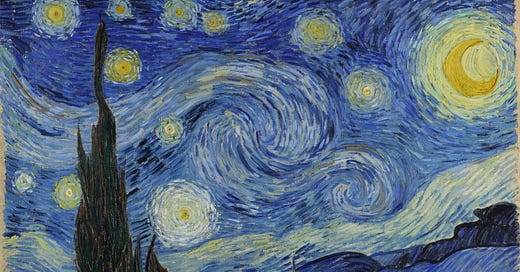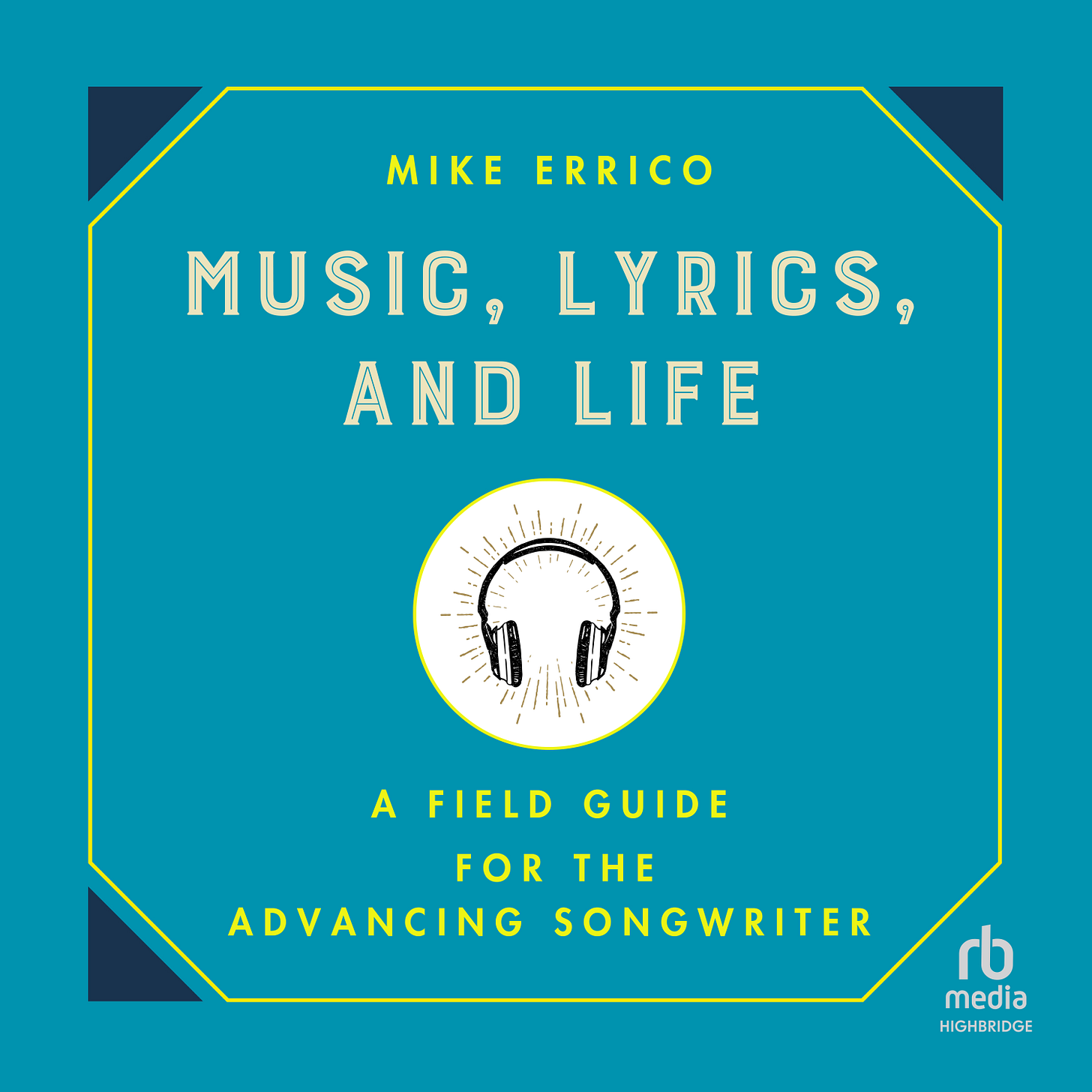What Even IS a Song, Really?
Here's a definition that can help your writing—no matter what you write.
Here’s what we know: Without a song, there’s nothing to sing, record, mix, master, market, or listen to. You go up to the mic, and nothing comes out. You go to a streaming service, and find an empty folder.
But what is a song, really? And what does it do? I used to think that was a ridiculous question, but I get a different answer from almost every person I ask. One on level, every answer is correct; a song is the result of a lot of private conversation. But it’s also true that we work with elements that unite all of our approaches. By finding those common elements, I think we can focus how we approach our individual answers.
Here’s a way to look at what a song is and what it can do, no matter what form you’re working in.
A Song Is Time
You can take in Van Gogh’s “Starry Night” in a blink, if you wanted to. You’d probably miss a lot, but it’s still possible. We, on the other hand, require time, and if you disagree, just take it out of the equation, and see what’s left: You’d have a song with a running time of 0:00. Not very impactful. We might have as much paint as Van Gogh, but our canvas is time.
You might be thinking, “So?” but consider what we know about time: It is a nonrenewable resource. Once you use it, it’s gone. Forever. If you wake up one day and think, “Wow, I’ve really wasted a lot of time recently. I should really get some back and put it to better use,” um, no. That’s not how it works. You get what you get, you use it, and that’s it.
Thought of this way, suddenly our song has a massive responsibility: to make good use of a nonrenewable resource.
But it gets deeper, because we’re not talking about our time. We’re talking about the listener’s time. Friends, strangers, people with their own lives, goals, dreams—and their own meager quantity of time here on earth. They’re out there in the parking lots and dance clubs of the planet, figuring out what they want to do with the time that has been mysteriously gifted to them.
And here you come along, asking to take some of that gift away.
That’s the first thing I think a song is:
A Song Is a Request
When we kick into the intro of our song, we are really asking for a listener’s time. This is an insane request! Who are we to knock on their door, like, “Hi. I would like the opportunity to take from you the only thing in the world you can never get back. Whattya say?”
If we’re going to ask, we have to make good on the deal. And it is a deal: It’s saying, “If you give me your time, I will give you something in return that will make you feel like you got the better end of the deal.”
That’s a high-stakes claim, and to make it happen, we need to employ the craft of songwriting—the drafting, the editing, sculpting, song form, harmony, lyric…and all of that energy has to combine into something that makes them feel like they’ve been given a gift.
That’s the next thing I think a song is:
A Song Is a Gift
If we are lucky enough to enter into this deal for the listener’s time, we get a shot at giving them something absolutely fantastic.
We take that time, and show what is possible within it. We give the listener the language they’ve always wanted, but were unable to find; we put into words the emotions they couldn’t articulate; we give a window of meaning into the lives they lead. I’m sure this is a gift you’ve been given many times. Same with me. How often have you been trying to explain something, and broken out into a song lyric? I feel like that happens to me a lot, and I think of it as a gift I was given by, oh, Stevie Wonder, or Taylor Swift, or Biz Markie, or Rogers & Hammerstein.
And this gift continues moving through language and into the vast abstract territory beyond rational thought. We hear chord sequences full of colors and emotions that have no names getting pulled from unknown corners of ourselves. It’s magic…but it’s real. This is why so many artists and thinkers aspire to musicality in their work.
We get quotes like:
Where words fail, music speaks.
— Rumi
After silence, that which comes nearest to expressing the inexpressible is music.
— Aldous Huxley
If I were not a physicist, I would probably be a musician. I often think in music. I live my daydreams in music. I see my life in terms of music.
― Albert Einstein
If I should ever die, God forbid, let this be my epitaph: “The only proof he needed for the existence of God was music.”
― Kurt Vonnegut
I mean, if you ever want to feel grateful for the canvas we chose to work with, just Google “Quotes about the power of music,” like I just did. There are thousands of them. I think part the reason is because, in songwriting, we get to combine these two shockingly beautiful and complex human accomplishments—language and music—and deliver them in one transcendent package.
That’s the gift.
If you still think that’s a reach, or not that big of a deal, consider the societies that crack down and censor what we do.
Things don’t get banned for having no power.
Why would songs end up on the business end of a government or political group? I think it’s because a song has an infectious kind of reach and a repetitive simplicity that teaches us how to sing along—and then how to congregate and sing along together. Before you know it, a song can define a community.
That’s another thing a song is:
A Song Is an Invitation
Yes, it’s an invitation into the world of the creator, and an invitation to see our own worlds from other perspectives. But, maybe most importantly, it’s an invitation to a tribe with an identity, a sound, and a mission.
In short, a song can take us from alone to among. And we LOVE that. As individual as we all are, we are pack animals at heart. We move, and thrive, in groups, and a song is a call to assemble—like wolves, like whales, like pretty much every other species on this planet. Songs punctuate our rituals, give us a group identity, and remind us that, as alone as we may feel we are at times, we are not alone.
It's no secret that our present society is suffering from an epidemic of loneliness. I’m seeing so many articles about isolation and its negative impact on our psyches. But at the same time, I’m watching footage from Chappell Roan shows or Taylor Swift stadium tours where the artists can barely hear themselves sing from the tens of thousands of fans who know every word.
That doesn’t happen without the song.
Maybe thinking about what we do in this way raises the bar for what we should expect from our work. We have a responsibility to those listeners, and to that nonrenewable resource, time. We face serious headwinds: our society downplays what we do as frivolous; they say we have too many songs already; they price a listen at $.0000-whatever cents; they elevate or desecrate songs based on political leanings, whether they exist or not. We struggle for people’s attention by using social media platforms that act like tollbooths to charge us for the privilege of an audience. It’s hard not to conclude that there’s an open cultural hostility in the air toward what we’re called to do.
That should tell you something. And that should sharpen your pens, your writing, your editing, and your sense of what your songs really are. I think the best ones start with the understanding of the deal being made: If you grant me your precious time, we can change everything.
My book, Music, Lyrics, and Life, is available in print and audiobook (narrated by me).
Personalized, signed copies are available on Bandcamp — get 25% off with the promo code: substack2025
…and if this is all too much, you could just buy me a coffee. Cheers.






Amazing!!